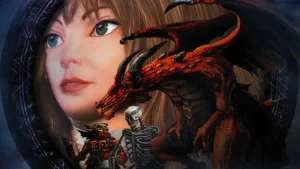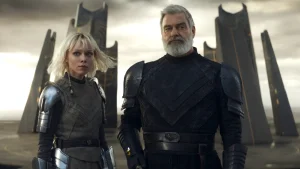Ever since making his directorial debut with Shallow Grave in 1994, Danny Boyle has specialized in crafting pleasant crowd-pleasers and thought-provoking works alike. On the former end there’s stuff like Slumdog Millionaire and Yesterday and, on the latter, there’s Trainspotting and Steve Jobs. Hovering between those two categories is 28 Days Later, which got the audience’s heartrate pumping while also making them think about the characters’ reactions to their struggles and dynamic with one another. This is also applicable to his unsung classic, Sunshine. Like Armageddon, Deep Impact, 2012, and The Day After Tomorrow, this is an end of the world movie, but tonally it couldn’t be any more different.
Sunshine is not nearly as focused on delivering bombastic set pieces as it is showing a diverse group of individuals engaging in a last-ditch effort to save the planet, and how that affects them on a personal level. That is, right up until it takes a hard left turn to a subgenre that was never particularly respectable in the critics’ eyes.
The core concept of Sunshine couldn’t be more compelling. It’s 2057, the Sun is on its way out, and there was a failed attempt a few years back to send a bomb into the Sun, thusly reigniting it and keeping the Earth from becoming a popsicle. And now, considering that voyage wasn’t a success, a new group of astronauts from the world over are sent to attempt the feat once more.
Things get more interesting for the crew when they receive a distress call from their predecessor, Icarus I. Some believe that, were the Icarus II to find the Icarus I, it could get a second payload to use. Others believe that it’s better to just go straight for the sun with the bomb they have.
The film is tense enough with the squabbling democracy aboard the Icarus II, but then some curveballs are thrown at the audience and the crew, all of which are effective. There is some human error on the part of Benedict Wong’s navigator, Trey, which costs the life of Hiroyuki Sanada’s ship captain, Kaneda. When they find the Icarus I and board it, there’s more conflict amongst the group members about who should use the one available spacesuit. Then there isn’t enough oxygen for the remaining five crewmembers so they have a vote on who should be, well, voted off the island (though the one who is voted out has ended up doing the deed for them).
Basically, there are a lot of plot developments that are both tense in their obvious encroaching danger and leave a lasting impact on the Icarus II‘s crew. Then, with half an hour left in the runtime, we discover that the captain of the Icarus I, who was seen on a tape aboard that vessel as having gone insane, has made himself a stowaway on the Icarus II. And, with that, Sunshine goes from a sci-fi thriller to a slasher film.
Icarus I‘s captain, Pinbacker, is the one truly underwritten character in the film. Everyone else we’ve gotten to know but he just comes in towards the end of the film and we’re supposed to accept that he’s the entire source of third-act tension. All we know about him is that he was a captain, he went insane, he’s all burned up, he killed his crew, and he thinks God wants the Earth gone. It’s just a surprisingly thin character for this film.
And even though he’s finally entered the picture, nothing more is added to him. In spirt of Mark Strong’s efforts, Pinbacker just feels like a stand-in for a particularly charmless Fredd Krueger.
Pinbacker pursues Cillian Murphy’s Capa, Chris Evans’ Mace, Rose Byrne’s Cassie, and Michelle Yeoh’s Corazon through the ship, murdering Corazon while Mace is frozen to death. Then, Capa pilots the payload towards the Sun with Cassie aboard as well. And, like how the Xenomorph attacked Ellen Ripley one last time on the Nostromo‘s escape shuttle, Pinbacker again grabs Capa and rants about God. Fortunately, he’s too late, and the mission is completed.
In other words, this is one of those sci-fi movies where no one walks out alive. Well, save for the people of Earth, whose collective survival help make Capa and Cassie’s offing feel about one thousand percent more thematically relevant and moving than Corazon’s, who just felt like cannon fodder for a rambling space slasher.
The post This 2000s Sci-Fi Movie Was Set for Masterpiece Status… & Then the Ending Happened appeared first on ComicBook.com.




